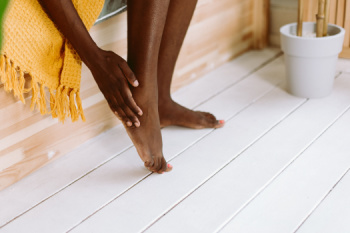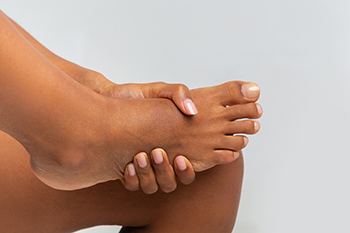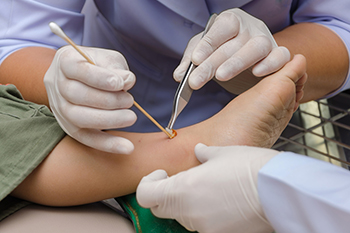Items filtered by date: December 2024
Various Types of Heel Pain

Heel pain is a common issue that can significantly impact daily activities. The most frequent causes include plantar fasciitis, Achilles tendonitis, Sever’s disease, and bursitis. Plantar fasciitis is an inflammation of the tissue that runs along the bottom of the foot, causing sharp pain, especially with the first few steps in the morning. Achilles tendonitis occurs when the Achilles tendon becomes inflamed, leading to pain at the back of the heel. Sever’s disease, common in growing children, is an inflammation of the growth plate in the heel. Bursitis occurs when the small fluid-filled sacs in the heel become inflamed, causing discomfort. The causes of heel pain can vary, from overuse and wearing poor footwear to biomechanical issues. A podiatrist can diagnose the root cause and recommend effective treatments, such as custom orthotics, stretching exercises, or even surgery, if needed. If you have heel pain, it is suggested that you schedule an appointment with a podiatrist to find relief.
Many people suffer from bouts of heel pain. For more information, contact one of our podiatrists of Advanced Ankle & Foot Surgeons. Our doctors can provide the care you need to keep you pain-free and on your feet.
Causes of Heel Pain
Heel pain is often associated with plantar fasciitis. The plantar fascia is a band of tissues that extends along the bottom of the foot. A rip or tear in this ligament can cause inflammation of the tissue.
Achilles tendonitis is another cause of heel pain. Inflammation of the Achilles tendon will cause pain from fractures and muscle tearing. Lack of flexibility is also another symptom.
Heel spurs are another cause of pain. When the tissues of the plantar fascia undergo a great deal of stress, it can lead to ligament separation from the heel bone, causing heel spurs.
Why Might Heel Pain Occur?
- Wearing ill-fitting shoes
- Wearing non-supportive shoes
- Weight change
- Excessive running
Treatments
Heel pain should be treated as soon as possible for immediate results. Keeping your feet in a stress-free environment will help. If you suffer from Achilles tendonitis or plantar fasciitis, applying ice will reduce the swelling. Stretching before an exercise like running will help the muscles. Using all these tips will help make heel pain a condition of the past.
If you have any questions please contact our office located in O'Fallon, and New Baden, IL . We offer the newest diagnostic and treatment technologies for all your foot and ankle needs.
How Psoriatic Arthritis Affects the Feet

Psoriatic arthritis, or PsA, often affects the feet, leading to inflammation and discomfort in the toes, ankles, and heels. Psoriatic arthritis can cause inflammation where tendons or ligaments attach to bones, commonly affecting the Achilles tendon and the plantar fascia. It also may result in dactylitis, or sausage toes, which involves swelling of the entire toe that makes walking and wearing shoes painful. Nail changes, such as pitting or separation from the nail bed, are also common with PsA. It also can lead to joint damage and deformities if left untreated, causing significant limitations in mobility. A podiatrist can provide valuable care by addressing symptoms with treatments aimed at reducing pain and inflammation. Other measures include prescribing orthotics to support affected areas and suggesting ways to help manage the condition effectively. Regular care from a podiatrist can improve comfort, prevent further joint damage, and enhance mobility. If you have foot problems related to psoriatic arthritis, it is suggested that you schedule an appointment with a podiatrist for treatment options.
Arthritis can be a difficult condition to live with. If you are seeking treatment, contact one of our podiatrists from Advanced Ankle & Foot Surgeons. Our doctors can provide the care you need to keep you pain-free and on your feet.
Arthritic Foot Care
Arthritis is a term that is commonly used to describe joint pain. The condition itself can occur to anyone of any age, race, or gender, and there are over 100 types of it. Nevertheless, arthritis is more commonly found in women compared to men, and it is also more prevalent in those who are overweight. The causes of arthritis vary depending on which type of arthritis you have. Osteoarthritis for example, is often caused by injury, while rheumatoid arthritis is caused by a misdirected immune system.
Symptoms
- Swelling
- Pain
- Stiffness
- Decreased Range of Motion
Arthritic symptoms range in severity, and they may come and go. Some symptoms stay the same for several years but could potentially get worse with time. Severe cases of arthritis can prevent its sufferers from performing daily activities and make walking difficult.
Risk Factors
- Occupation – Occupations requiring repetitive knee movements have been linked to osteoarthritis
- Obesity – Excess weight can contribute to osteoarthritis development
- Infection – Microbial agents can infect the joints and trigger arthritis
- Joint Injuries – Damage to joints may lead to osteoarthritis
- Age – Risk increases with age
- Gender –Most types are more common in women
- Genetics – Arthritis can be hereditary
If you suspect your arthritis is affecting your feet, it is crucial that you see a podiatrist immediately. Your doctor will be able to address your specific case and help you decide which treatment method is best for you.
If you have any questions, please feel free to contact our office located in O'Fallon, and New Baden, IL . We offer the newest diagnostic and treatment technologies for all your foot care needs.
Various Causes of Foot Pain

Foot pain can arise from a variety of conditions, including injuries, gout, warts, or bunions. Injuries like sprains, fractures, or strains can cause swelling, bruising, and difficulty walking. Gout, a type of arthritis, causes sudden, intense pain, often in the big toe, accompanied by redness and warmth. Warts, caused by a viral infection, appear as small, rough growths on the skin. Bunions are painful, bony bumps that form at the base of the big toe, often due to tight shoes or genetic factors. The causes of foot pain vary, from trauma and poor footwear to underlying health conditions like arthritis or infections. Treatments range from rest for injuries, medication for gout, to more specialized treatments like padding for warts or surgery for bunions. A podiatrist can provide an accurate diagnosis and effective treatments to relieve pain and prevent future issues. If you are experiencing foot pain, it is suggested that you make an appointment with a podiatrist.
Foot Pain
Foot pain can be extremely painful and debilitating. If you have a foot pain, consult with one of our podiatrists from Advanced Ankle & Foot Surgeons. Our doctors will assess your condition and provide you with quality foot and ankle treatment.
Causes
Foot pain is a very broad condition that could be caused by one or more ailments. The most common include:
- Bunions
- Hammertoes
- Plantar Fasciitis
- Bone Spurs
- Corns
- Tarsal Tunnel Syndrome
- Ingrown Toenails
- Arthritis (such as Gout, Rheumatoid, and Osteoarthritis)
- Flat Feet
- Injury (from stress fractures, broken toe, foot, ankle, Achilles tendon ruptures, and sprains)
- And more
Diagnosis
To figure out the cause of foot pain, podiatrists utilize several different methods. This can range from simple visual inspections and sensation tests to X-rays and MRI scans. Prior medical history, family medical history, and any recent physical traumatic events will all be taken into consideration for a proper diagnosis.
Treatment
Treatment depends upon the cause of the foot pain. Whether it is resting, staying off the foot, or having surgery; podiatrists have a number of treatment options available for foot pain.
If you have any questions, please feel free to contact our office located in O'Fallon, and New Baden, IL . We offer the newest diagnostic and treatment technologies for all your foot care needs.
Symptoms and Treatment of Hammertoes

Hammertoe is a common condition where one or more of the smaller toes bend at the middle joint, creating a curled or Z-shaped appearance. A hammertoe deformity often results from an imbalance in the tendons that control toe movement, which can develop due to genetic factors, injury, or pressure from other foot conditions like bunions. The second toe is most commonly affected, and symptoms include pain and difficulty wearing tight shoes. Corns on the top of the toe and calluses on the ball of the foot may form by extra pressure while walking. An X-ray may be taken to determine the severity of the hammertoe. Treatment options include taping or splinting the toe to reduce strain, as well as wearing orthotics that help redistribute pressure and improve foot alignment. A podiatrist can offer noninvasive measures as well as surgical solutions to relieve pain and restore proper foot function. If you have a painful hammertoe, it is suggested that you schedule an appointment with a podiatrist for treatment.
Hammertoe
Hammertoes can be a painful condition to live with. For more information, contact one of our podiatrists from Advanced Ankle & Foot Surgeons. Our doctors will answer any of your foot- and ankle-related questions.
Hammertoe is a foot deformity that affects the joints of the second, third, fourth, or fifth toes of your feet. It is a painful foot condition in which these toes curl and arch up, which can often lead to pain when wearing footwear.
Symptoms
- Pain in the affected toes
- Development of corns or calluses due to friction
- Inflammation
- Redness
- Contracture of the toes
Causes
Genetics – People who are genetically predisposed to hammertoe are often more susceptible
Arthritis – Because arthritis affects the joints in your toes, further deformities stemming from arthritis can occur
Trauma – Direct trauma to the toes could potentially lead to hammertoe
Ill-fitting shoes – Undue pressure on the front of the toes from ill-fitting shoes can potentially lead to the development of hammertoe
Treatment
Orthotics – Custom made inserts can be used to help relieve pressure placed on the toes and therefore relieve some of the pain associated with it
Medications – Oral medications such as anti-inflammatories or NSAIDs could be used to treat the pain and inflammation hammertoes causes. Injections of corticosteroids are also sometimes used
Surgery – In more severe cases where the hammertoes have become more rigid, foot surgery is a potential option
If you have any questions please contact our office located in O'Fallon, and New Baden, IL . We offer the newest diagnostic and treatment technologies for all your foot and ankle needs.
Understanding Debridement for Diabetic Foot Ulcers

Diabetic foot ulcers are open sores or wounds that can develop on the feet of individuals with diabetes due to poor circulation and nerve damage. These ulcers can become chronic, slow to heal, and prone to infection if left untreated. An important treatment for managing diabetic foot ulcers is debridement, a process where dead or infected tissue is carefully removed from the wound. Debridement is essential because it stimulates healthy tissue growth, reduces the risk of infection, and promotes faster healing by allowing the body’s natural repair processes to function effectively. By removing dead tissue, debridement helps improve blood flow to the area, which is vital for recovery in diabetic patients with circulation issues. If you suffer from diabetic foot ulcers, it is suggested that you schedule appointments with a podiatrist for regular debridement, to prevent complications, avoid further tissue damage, and ultimately protect the foot from severe infection or amputation.
Wound care is an important part in dealing with diabetes. If you have diabetes and a foot wound or would like more information about wound care for diabetics, consult with one of our podiatrists from Advanced Ankle & Foot Surgeons. Our doctors will assess your condition and provide you with quality foot and ankle treatment.
What Is Wound Care?
Wound care is the practice of taking proper care of a wound. This can range from the smallest to the largest of wounds. While everyone can benefit from proper wound care, it is much more important for diabetics. Diabetics often suffer from poor blood circulation which causes wounds to heal much slower than they would in a non-diabetic.
What Is the Importance of Wound Care?
While it may not seem apparent with small ulcers on the foot, for diabetics, any size ulcer can become infected. Diabetics often also suffer from neuropathy, or nerve loss. This means they might not even feel when they have an ulcer on their foot. If the wound becomes severely infected, amputation may be necessary. Therefore, it is of the upmost importance to properly care for any and all foot wounds.
How to Care for Wounds
The best way to care for foot wounds is to prevent them. For diabetics, this means daily inspections of the feet for any signs of abnormalities or ulcers. It is also recommended to see a podiatrist several times a year for a foot inspection. If you do have an ulcer, run the wound under water to clear dirt from the wound; then apply antibiotic ointment to the wound and cover with a bandage. Bandages should be changed daily and keeping pressure off the wound is smart. It is advised to see a podiatrist, who can keep an eye on it.
If you have any questions, please feel free to contact our office located in O'Fallon, and New Baden, IL . We offer the newest diagnostic and treatment technologies for all your foot care needs.

